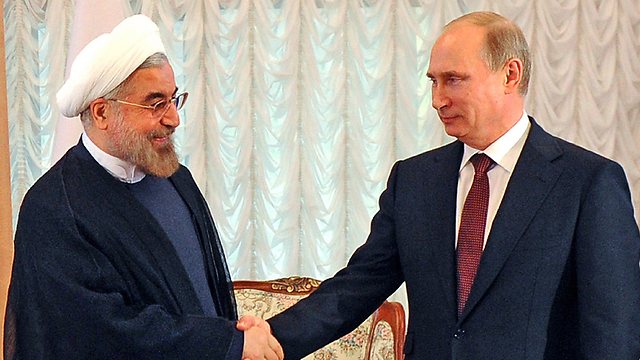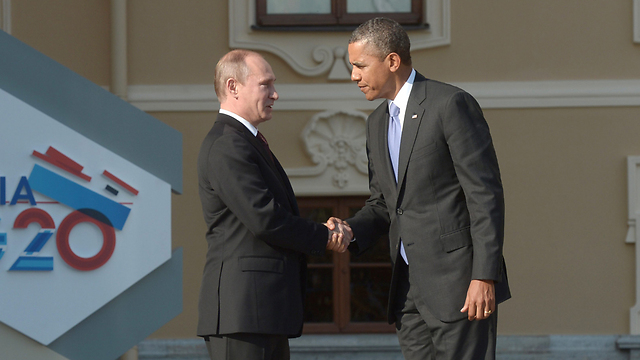
Obama: Tehran should not look at Syria and assume US won't attack
After reaching treaty with Russia on Syria chemical disarm, US hopes to implement similar model on Iran. In ABC interview, Obama confirms he corresponded with Iran's Rohani regarding Syria situation, says Washington will continue to pressure Tehran to give up nuclear program
WASHINGTON - Following the diplomatic solution in Syria, US President Barack Obama is setting his sights on Iran: the president Sunday compared policy on Syria to policy on Iran. In an interview with ABC, he said, "I think the new Iranian president will not make our job easier, but I think if you have a credible threat of force, along with strenuous diplomatic efforts ... it is possible to reach an agreement."
Relate stories:
- Kerry in Israel: Threat of force against Syria is real
- Damascus calls US-Russia deal 'victory for Syria'
- Obama says deal on chemical weapons a plus for all
Obama confirmed for the first time in an interview that he had corresponded with Iranian President Hassan Rohani, due to the desire of both to help stabilize the situation in Syria. He said in an interview that he believed the US threat to attack Syria, plus the transition to a diplomatic solution in the form of the Russian initiative for chemical disarmament, signaled to the Tehran regime the reality of the potential threat over the dispute on Iran's nuclear program, and its possible solution.
"They shouldn't draw a lesson ... to think we won't strike Iran,” Obama explained, but also said, "There is the potential of resolving these issues diplomatically."
In the interview, President Obama defended his policy toward Syria and said that although it did not seem clear, it worked. He said he believed that the conduct of America on the Syria issue increased the power of deterrence of the US, and reduced the chance that the Assad regime would use chemical weapons in the near future.
"I think that folks here in Washington like to grade on style," Obama said. "And so had we rolled out something that was very smooth and disciplined and linear, they would have graded it well, even if it was a disastrous policy."
Rohani and Putin (Photo: AFP)
He said a signed agreement signed had a better chance of achieving this goal, than a military attack. He added that “style points” were less important to him than “getting policy right.” According to Obama, his goal was to ensure that what happened on August 21, would not happen again. "What I've said consistently throughout is that the chemical weapons issue is a problem. I want that problem dealt with," Obama said.
Obama addressed the op-ed article written by Russian President Vladimir Putin and published in the New York Times, “I don't think that Mr. Putin has the same values that we do,” Obama said. He noted the Russian leader's support for the Syrian regime, adding, “I think, obviously, by protecting Mr. Assad, he has a different attitude about the Assad regime.”
And Obama dismissed Putin's charge that it was the Syrian rebels who launched the chemical weapons attack, instead of forces loyal to Syrian President Bashar Assad, as Washington believes. "Well, nobody around the world takes seriously the idea that the rebels were the perpetrators of this," Obama said.
Putin and Obama (Photo: EPA)
Last week, the Los Angeles Times reported that the US administration and the new leadership in Tehran were in contact behind the scenes, to promote direct talks between Obama and the Iranian president. According to the newspaper, the talks began with discussions on the situation in Syria.
Diplomatic relations between the two countries were severed after the 1979 American hostage crisis in Iran, when armed Iranian students supporting the country’s revolution, took over the US embassy in Tehran.
After years of the United States avoiding a meeting with Rohani's predecessor, Mahmoud Ahmadinejad, American officials told the Los Angeles Times that the two country’s presidents might meet on the sidelines of the UN General Assembly, set to take place at the end of the month. On September 24, Rohani is scheduled, for the first time, to give a speech to the forum.
- Receive Ynetnews updates directly to your desktop













